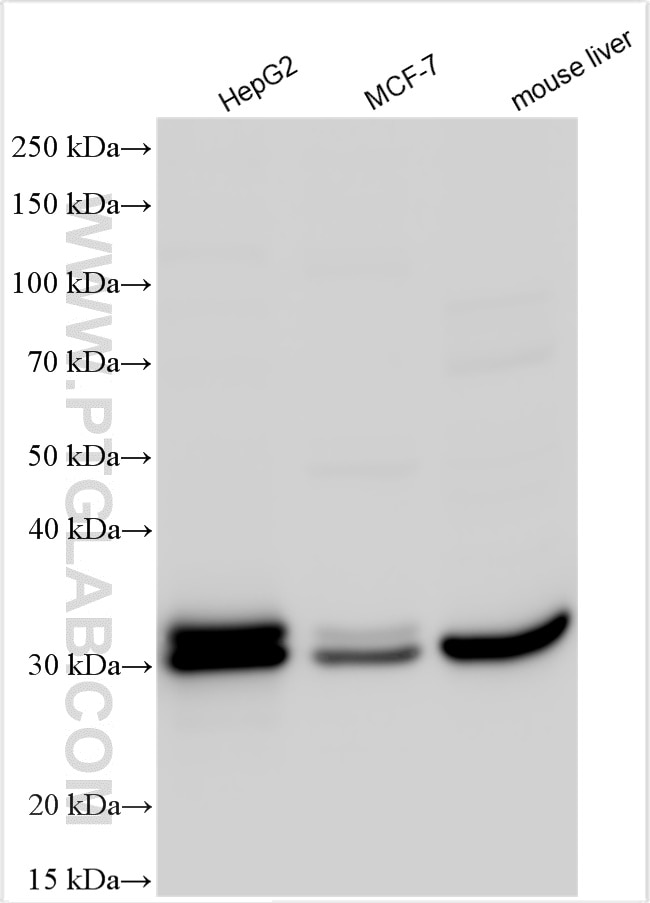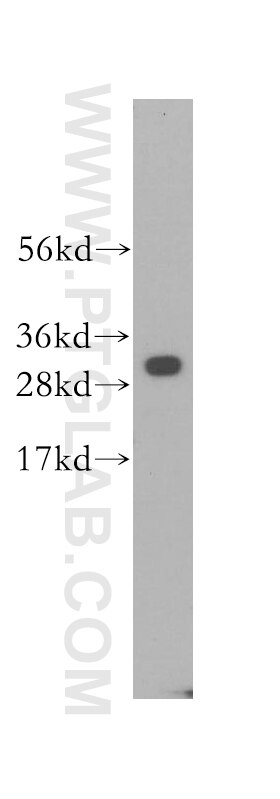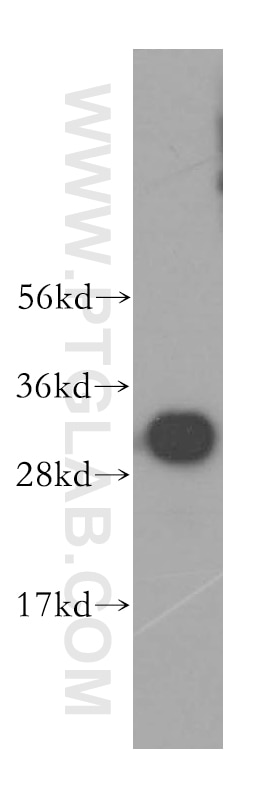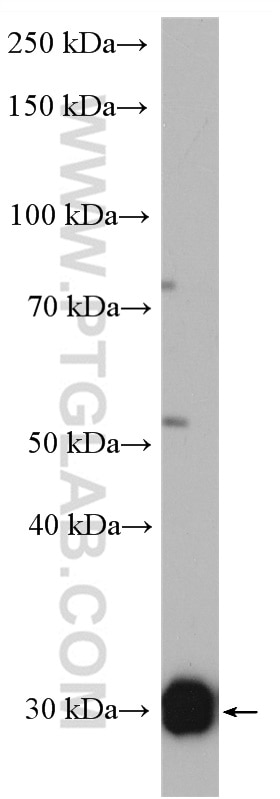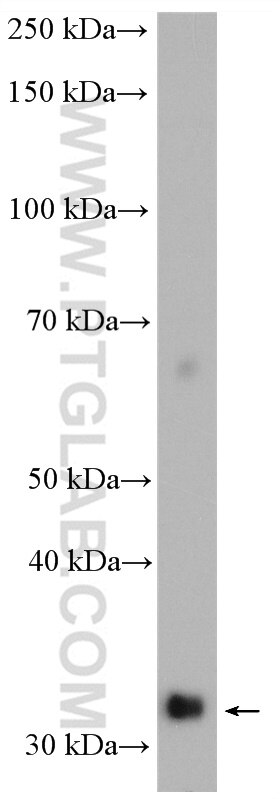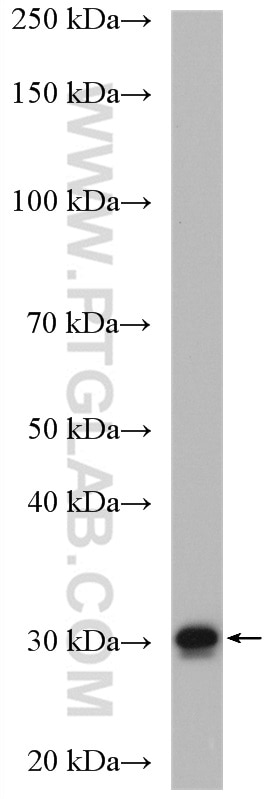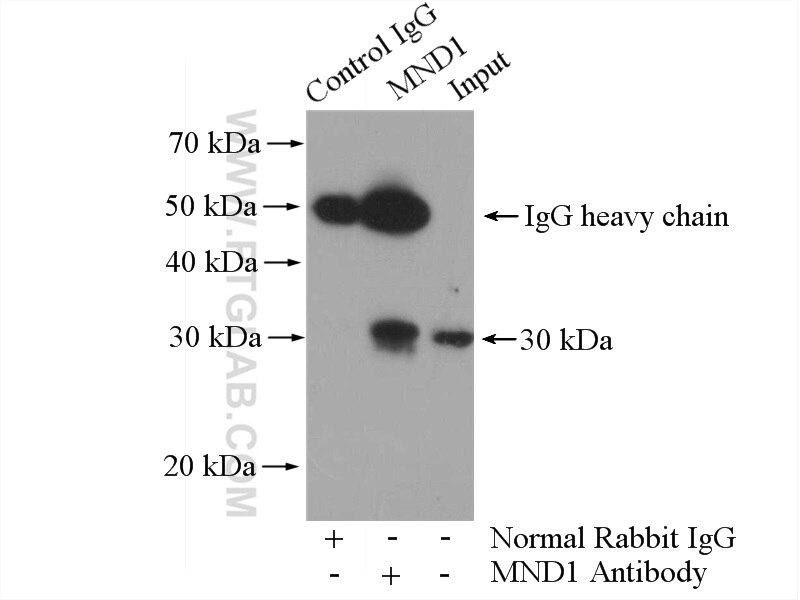- Featured Product
- KD/KO Validated
MND1 Polyklonaler Antikörper
MND1 Polyklonal Antikörper für WB, IP, ELISA
Wirt / Isotyp
Kaninchen / IgG
Getestete Reaktivität
human, Maus
Anwendung
WB, IF, IP, ELISA
Konjugation
Unkonjugiert
Kat-Nr. : 11636-1-AP
Synonyme
Geprüfte Anwendungen
| Erfolgreiche Detektion in WB | HepG2-Zellen, humanes Nierengewebe, humanes Lebergewebe, humanes Lungengewebe, MCF-7-Zellen, Mauslebergewebe |
| Erfolgreiche IP | Mauslebergewebe |
Empfohlene Verdünnung
| Anwendung | Verdünnung |
|---|---|
| Western Blot (WB) | WB : 1:500-1:3000 |
| Immunpräzipitation (IP) | IP : 0.5-4.0 ug for 1.0-3.0 mg of total protein lysate |
| It is recommended that this reagent should be titrated in each testing system to obtain optimal results. | |
| Sample-dependent, check data in validation data gallery | |
Veröffentlichte Anwendungen
| KD/KO | See 2 publications below |
| WB | See 2 publications below |
| IF | See 1 publications below |
Produktinformation
11636-1-AP bindet in WB, IF, IP, ELISA MND1 und zeigt Reaktivität mit human, Maus
| Getestete Reaktivität | human, Maus |
| In Publikationen genannte Reaktivität | human |
| Wirt / Isotyp | Kaninchen / IgG |
| Klonalität | Polyklonal |
| Typ | Antikörper |
| Immunogen | MND1 fusion protein Ag2210 |
| Vollständiger Name | meiotic nuclear divisions 1 homolog (S. cerevisiae) |
| Berechnetes Molekulargewicht | 205 aa, 24 kDa |
| Beobachtetes Molekulargewicht | 30-35 kDa |
| GenBank-Zugangsnummer | BC032142 |
| Gene symbol | MND1 |
| Gene ID (NCBI) | 84057 |
| Konjugation | Unkonjugiert |
| Form | Liquid |
| Reinigungsmethode | Antigen-Affinitätsreinigung |
| Lagerungspuffer | PBS with 0.02% sodium azide and 50% glycerol |
| Lagerungsbedingungen | Bei -20°C lagern. Nach dem Versand ein Jahr lang stabil Aliquotieren ist bei -20oC Lagerung nicht notwendig. 20ul Größen enthalten 0,1% BSA. |
Protokolle
| PRODUKTSPEZIFISCHE PROTOKOLLE | |
|---|---|
| WB protocol for MND1 antibody 11636-1-AP | Protokoll herunterladen |
| IP protocol for MND1 antibody 11636-1-AP | Protokoll herunterladen |
| STANDARD-PROTOKOLLE | |
|---|---|
| Klicken Sie hier, um unsere Standardprotokolle anzuzeigen |
Publikationen
| Species | Application | Title |
|---|---|---|
Oncotarget A study of meiomitosis and novel pathways of genomic instability in cutaneous T-cell lymphomas (CTCL). | ||
Med Oncol Meiotic nuclear divisions 1 promotes proliferation and metastasis in hepatocellular carcinoma and is a potential diagnostic and therapeutic target gene
| ||
J Inflamm Res Integrative Pan-Cancer Analysis Reveals the Oncogenic Role of MND1 and Validation of MND1's Role in Breast Cancer
|

